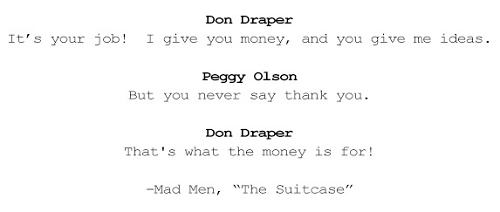Why Making More Money Won’t Necessarily Make You Happy

How satisfied are you with your job? Do you like the amount you make doing what you do for a living?
Many people often say, “I’d be happier if I could only make this much money per month, or annually.” But, in reality, that is not what usually happens. You might be better off with more money, but not really happier. Only one thing will bring the joy and work satisfaction you want—you need deep, rich, heartwarming meaning.
Look at the people who already make the kind of money you want, and even more; people who were once like you, wishing they’d get breaks and make more money. They might appear happier now that they got their big break, are making more money and are not struggling to get by, but dig a little deeper and you will realize it’s not the money, or the higher buying power that makes them happy.
Take people like Mark Zuckerberg, Oprah Winfrey, Bill Gates, Warren Buffett, Richard Branson, J.K. Rowling—billionaires. You might not believe it looking at where they are now, but they were once ordinary people just like you and me when they were starting out. They faced similar (if not more difficult) challenges as you are facing, and yearned for more money to help them achieve more.
Somehow these billionaires overcame the obstacles standing between them and success, accumulated insane amounts of money, but once they had all that money, what do they do with it? They, shockingly, give it away to charity, and other worthy causes. Why do they do that? How can you willingly give away the lion’s share of your money after all the hoops you’ve had to jump through to get it?
Money itself doesn’t make you happy.
Only recently, Mark Zuckerberg and his wife, Priscilla Chan, pledged to donate 99% of their Facebook shares – worth about $45 billion US – to philanthropic activities much to many people's shock and dismay. Why did they do that? What does Zuck (and other truly rich people) know about money that we don’t, or that we do know, but don’t fully understand?
Obviously, all that money doesn’t make them completely satisfied. They feel they can still be happy without it, so they give it away.
Human beings are not money-driven by nature. It’s doing meaningful work that matters
All of us inherently want work that is meaningful; work that makes a difference in other people’s lives; work that ennobles us in at least some small way.
In the television show Mad Men, we get a glimpse of this deep human need to want something more from work than wages in one particular exchange Don Draper has with Peggy Olsen:

British philosopher and writer Alan Watts saw money as a type of bribe for doing something you wouldn’t ordinarily do. If you can work on something without being driven solely by its monetary compensation, it is not really work.
Warren Buffet famously said, “Take a job that you love; you will jump out of bed in the morning.” He was echoing the immortal career advice of Confucius: “Choose a job you love, and you will never have to work a day in your life.”
There comes a time in each person's life when we want meaning in what we do; when we want work that ennobles us so much that we are willing to take home a thinner pay envelope to get it.
That is why truly rich people, those who have worked so hard, overcome many obstacles and achieved extraordinary success in their careers willingly give away their money to charity, and immerse themselves in philanthropic activities. They are looking for more than just money. They want meaning in what they do.
Of course, work that is adequately compensated is an important social good, and we wouldn’t work without it. But, we ultimately care about more than money; we care about work that is worth doing.
We are all looking for more than just money out of life
You might say those are examples of billionaires — people who have the financial security to care about more than just their paychecks, and the privilege to work in fields where it is possible to find meaning and personal satisfaction. But, lawyers also leave white-shoe firms to serve the underclass. Doctors abandon cushy practices to work in dilapidated clinics that serve poorer areas. Journalists risk it all and fly to war-torn areas to report on the plight of suffering men, women and children caught in the conflict.
Still, you might say these are professionals with steady jobs who can afford to have such lofty aspiration. What about the janitor? The trash collector? The clerks at Safeway? The people who make sandwiches at the deli next door?
Amy Wrzesniewski, an organizational behavior professor at Yale, led an interesting study of custodians in a major academic hospital about 15 years ago. Wrzesniewski and colleagues noticed that although the custodians’ official job duties never mentioned other human beings, many of them considered their jobs as including doing whatever they could to comfort patients and their families, and also to assist the professional staff members with patient care.
The custodians would go out of their way to help family members of patients find their way around the hospital, joke with patients to calm them down so that nurses could insert IVs, and even dance for patients to entertain or cheer them up a little. Even though the custodians received no financial compensation for this “extra” work, they said this aspect of the job was what got them out of bed every morning. “I enjoy entertaining the patients,” said one. “That’s what I enjoy the most.”
Similarly, Adam Grant, a management professor at Wharton, studied a group of college students who worked as phone solicitors, calling alumni to ask for contributions to their university. As part of the study, Professor Grant arranged for a recent graduate who had attended the university on a scholarship funded by such solicitation efforts to meet the students. The graduate gave a short talk about how the scholarship had affected his life and how grateful he was for the students’ solicitation efforts.
Grant found that the money raised after the talk increased 171 percent, even though there was no added compensation for the students’ harder work. The only thing that had changed was that the students now had a deeper sense of purpose in their solicitation efforts.
Even when you consider seemingly mundane and somewhat simple tasks as helping someone load a coach into a van, one study out of Duke University found that people are less likely to help when you offer them a small payment than when you don’t. That’s because the offer of a pay makes the task a commercial transaction rather than a favor to another human being.
Given the chance to make work meaningful and engaging, people jump at it
These are just a few of the many instances that demonstrate when given the chance to make work meaningful and engaging, people jump at it, even if it means that they have to work harder.
Such cases should remind us all, especially those of us in creative professions, who have control over when and what we work on, that we are fortunate to do what we do. Many people, the overwhelming majority on the planet, instead of being able to take pride in what they do, and derive joy and satisfaction from doing it well, have little to show for their efforts aside from their pay.
Be wary, therefore, of the many get-rich-quick skims on the Internet and alluring messages that extol making 6 or 7 figures from your work or business. These messages often project a false picture that making more money is the ultimate achievement. Money in itself won’t make you happy.
As Alan Watts aptly said in one of his famous lectures:
“If you say that getting the money is the most important thing, you will spend your life completely wasting your time. You’ll be doing things you don’t like doing in order to go on living, that is to go on doing things you don’t like doing, which is stupid. Better to have a short life that is full of what you like doing than a long life spent in a miserable way.”
Do things that you know in your heart really matter.




















